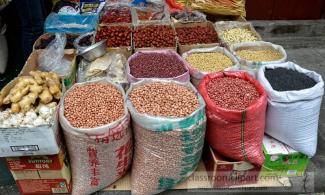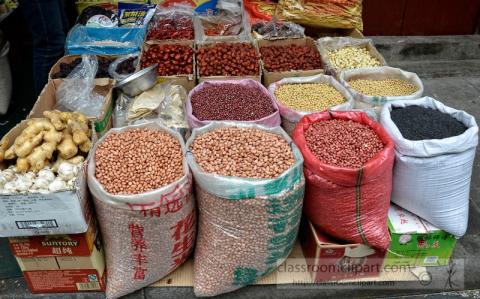
The average annual rate of change of the food sub-index for the twelve-month period ending September 2018 over the previous twelve-month average was 15.92 per cent, 0.58 per cent points from the average annual rate of change recorded in August (16.50) per cent.

The composite food index has risen by 13.31 per cent in September 2018 compared to 13.16 per cent in August 2018 according to the National Bureau of Statistics (NBS) monthly inflation report.
This rise in the food index was propelled by hike in prices of tubers, vegetables, fruits, meat, milk, cheese, eggs, bread, cereals, and fish. On month-on-month basis, the food sub-index increased by 1.00 per cent in September 2018, down by 0.42 per cent points from 1.42 per cent recorded in August.
The average annual rate of change of the food sub-index for the twelve-month period ending September 2018 over the previous twelve-month average was 15.92 per cent, 0.58 per cent points from the average annual rate of change recorded in August (16.50) per cent.
In September 2018, five states did not record any rise in the cost of food products. They are, Katsina, Kogi, Nasarawa, Niger and Plateau. They all recorded food price deflation or negative inflation (general decrease in the general price level of goods and services or a negative inflation rate).
On a year-on-year basis, food inflation was most pronounced in Kwara (17.17%), Bayelsa (16.62%) and Abuja (15.70%). Plateau (8.82%), Abia (10.10%) and Ogun (11.11%) recorded the slowest rise in food inflation.
Viewing from a month-on-month angle, hike in food prices remained highest in Kwara (3.39%), Adamawa (2.59%) and Kebbi (2.23%).
Conversely, all products in the Food and Agricultural Organisation (FAO) basket, recorded a month-on-month drop with the exception of sugar that saw a 2.6 per cent rise.
FAO measures the price of cereals, oilseeds, dairy products, meat and sugar.
When agricultural products are substituted from other products, it is called the All items less farm produce index.
This composition of prices dropped to 9.8 per cent in September 2018, down 0.2 per cent from 10.00 per cent in August 2018.
On a month-on-month parameter, these basket of prices which is also called core inflation, increased by 0.64 per cent in September 2018. This was down by 0.14 per cent when measured against the 0.78 per cent recorded in August 2018.
The items with high price surges in this category were fuels and lubricants for personal transport, vehicle spare parts, dental services, tobacco, carpets and other floor coverings, furniture and furnishing as well as hospital services.
The average 12-month annual rate of change of the core inflation index was 11.09 per cent for the 12-month period ending September 2018; this is 0.19 per cent points lower than 11.28 per cent recorded in August.
The calculation of inflation, however, is measured through the Consumer Price Index (CPI) and it rose from 11.23 per cent in August to 11.28 per cent in September.
According to the NBS, the percentage change in the average composite CPI for the 12-month period ending September 2018 over the average of the CPI for the previous twelve months period ending September 2017, was 13.16 per cent; 0.39 per cent points from 13.55 per cent recorded in August 2018.